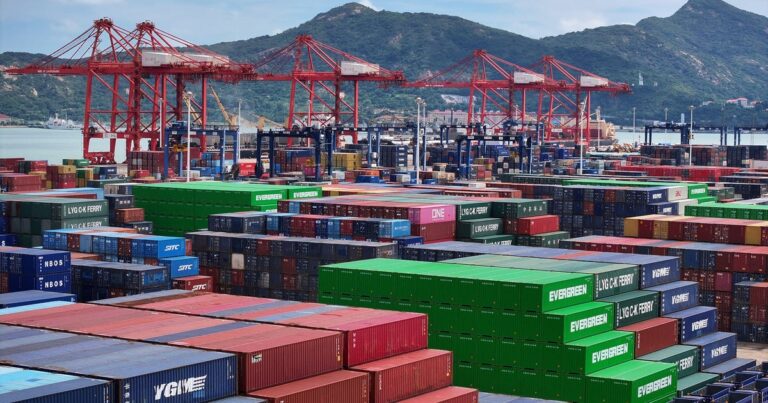Despite a barrage of new tariffs imposed by the Trump administration this year on dozens of U.S. trade partners, the prices of goods and services across the U.S. have defied many economists’ expectations and remained relatively stable.
Economists caution that just because tariffs have yet to trigger a renewed bout of inflation, there is no guarantee that prices won’t surge later this year. They note that recent data shows a modest rise in the cost of items including clothing, home furnishings and appliances.
Tariffs — meaning the rate importers must pay at the border for imported goods — also take a long time to seep into the economy. That’s because companies often try to hold off on passing along higher costs to customers to avoid losing market share to rivals.
Yet experts acknowledge that tariffs have yet to unleash the kind of severe inflationary pressures that could cause prices to spike. For their part, White House officials have consistently maintained that foreign exporters — not American consumers — will bear the brunt of added tariff costs.
“Despite the doom-and-gloom predictions of inflation and recession, it’s been months since Liberation Day, and inflation is trending towards an annualized rate not seen since President Trump’s first term, while a recent [Council of Economic Advisers] analysis found that prices of imported goods are actually declining,” White House spokesman Kush Desai said in a statement to CBS MoneyWatch, alluding to the baseline and other tariffs President Trump originally announced on April 2.
Here are four reasons economists say explain why inflation isn’t jumping despite the highest U.S. tariffs in decades.
Tariffs aren’t as high as many people expected
Despite President Trump’s many threats to jack up levies on imports, the actual average tariff rate being charged on U.S. imports is not as high as what has been announced, data shows.
The average tariff rate on U.S. imports in June was 9% — well below the 15% that many economists were forecasting earlier this year following Mr. Trump’s slew of tariff announcements, according to investment advisory firm Capital Economics.
“It’s not so much that the reaction to tariffs has been low, it’s that the effective tariff rate increase has been relatively limited up until June,” Mark Cus, an economist at Barclays, told CBS MoneyWatch.
Actual U.S. tariffs remain lower than earlier estimates in part because countries facing steeper levies are sending fewer goods to the U.S., according to Barclays and Capital Economics. By contrast, countries with below average tariff rates are shipping more goods to the U.S.
The upshot: Average tariff rates on imports are lower than many economists were projecting earlier this year.
Additionally, many goods imported into the U.S. have been exempted from steeper tariffs. Of the roughly $258 billion worth of imports that hit the U.S. retail market in June, only 48% were subject to tariffs, Barclays data shows. For example, pharmaceuticals, some electronics and many imports from Canada and Mexico are exempt from any new tariffs.
“While dutiable goods face elevated tariff rates, a substantial portion of U.S. imports remains duty-free,” Barclays analysts said in a recent report. “This is a major contributor to the low effective tariff rate.”
Companies stocked up before higher tariffs kicked in
U.S. retailers built up their inventories earlier this year in expectation that the Trump administration would hike tariffs on imported products and parts. Many retailers are still selling those non-tariffed products, allowing them to delay price hikes, experts said.
For example, “There was a big jump in imports of goods from Canada that would later be tariffed before the tariffs kicked in, and perhaps imports of those goods in May and June were relatively low, and that shows up as a smaller amount of dutiable goods,” Barclays’ Cus told CBS MoneyWatch.
Eventually, experts warn, retailers will exhaust those lower-cost goods imported earlier in the year, which could lead to higher prices down the road.
Retailers are swallowing the costs — for now
For now, many retailers are eating the additional tariff costs.
Businesses “have been willing to absorb the initial hit via lower margins, although we suspect that was mostly a temporary development as those firms waited for more clarity on where tariff rates would settle,” analysts with investment adviser Capital Economics said in a recent report.
“We doubt that is a sustainable outcome over the longer term, however. As the uncertainty over tariff levels eases over the next couple of weeks, giving retailers more clarity on rates over the next year or two, we would expect more firms to raise prices,” they said.
Tariffs tend to boost inflation gradually
Tariffs typically take many months to seep into company supply chains and show up in the prices consumers pay at the store.
The full impact of tariffs plays out not immediately but over an extended period of time, peaking roughly a year after they take effect, a June Federal Reserve Bank of Dallas report noted. That means any U.S. tariffs imposed this year would be unlikely to have much of an impact on inflation until later this year and into 2026.
“Up to now there has been only limited passthrough from tariffs into final consumer prices, but we still expect the impact to gradually mount in the second half of this year,” Capital Economics analysts said in a report.
A final possibility is that the fears that the Trump administration’s turn toward protectionist trade policies would trigger another severe bout of inflation are overblown. The White House has maintained that such a shift will protect jobs and make the U.S. more competitive globally.
“The Administration has consistently maintained that the cost of tariffs will be paid by foreign exporters who rely on access to the American economy, the world’s best and biggest consumer market,” the White House’s Desai said in a statement.
